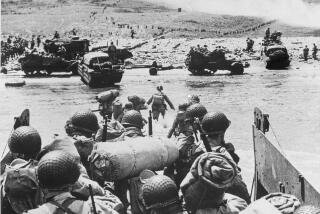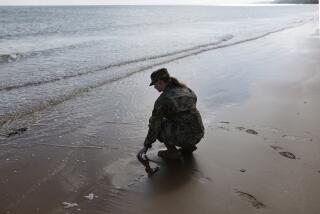Veterans Recall Bloody Battle for Crete
- Share via
HANIA, Greece — Dozens of old men stood at attention, pouring rain mingling with their tears and soaking their full military uniforms.
When the bagpipes stopped playing, they turned to look for friends and comrades last seen half a century ago in trenches, prison camps and hospitals.
The British, Australian and New Zealand veterans were taking part in emotional ceremonies to mark the 50th anniversary of the Battle of Crete, which began May 20, 1941, and lasted 10 days.
Both sides suffered severe casualties--about 11,000 dead--when Allied and Greek forces and resistance fighters tried in vain to hold the Greek island of Crete against Hitler’s invading armies in one of the most ferocious battles of World War II.
British veteran Roy Farran, a former lieutenant in the Royal Artillery, pointed to the row of medals on his chest. “Italy, France, El Alamein. Of all the battles I’ve been in, this here was the fiercest,” he said.
At the Allied cemetery in nearby Souda, another veteran read a name on a gravestone, sank to his knees and whispered: “I thought he had lived.”
At a separate ceremony at the German war cemetery near the village of Maleme, the victors wore civilian clothes and sported no ribbons.
German Chancellor Helmut Kohl stood in front of the graves of 4,665 people with Greek Prime Minister Constantine Mitsotakis, a Cretan who was imprisoned by the Nazis for his part in the resistance.
About 8,000 German soldiers were dropped by parachute and gliders in the olive groves and villages of Crete.
Many were killed before touching ground on the first day of the battle, and casualties were so heavy that Hitler never again attempted an airborne attack.
“When they dropped us most of us were teen-agers who didn’t know much,” said Ewald Feldhaus, a member of the German Parachute Engineers veterans union who now lives in Britain.
Germans remembered being dropped in their winter clothing in scorching heat and having to face unexpected and intense Cretan resistance.
“We never came to fight civilians,” said Walter Riehle, a parachutist in the battle. “We were told civilians would not fight.”
Greece had already fallen to the Germans, and British, Commonwealth and some Greek forces had retreated here along with King George of the Hellenes and the Greek government.
With the Cretan army unit cut off in mainland Greece, women and priests, boys and grandfathers joined in the battle, attacking the young Germans with rocks, knives and pitchforks.
During the fighting, the king and government ministers escaped to Egypt. Thousands of allied troops were captured. Thousands more were evacuated from the southern coast.
The German occupation lasted until May, 1945. For the Cretans, memories of the war, the subsequent occupation and reprisals remain fresh as stories are passed from one generation to the next.
Hotel owner Yannis Peroyannis was 15 when the fierce land, sea and air battle broke out in his hometown of Hania. He brought his 15-year-old son to British veteran Edward Howell and asked the much-decorated former squadron leader: “Tell my boy how you got your cross.”
At an exhibition at the Venetian castle in the port of Hania, old arms and ammunition seem too primitive to have caused so many deaths.
In the visitors book people have written in many languages that war must never happen again.
A Dr. Tindler from Hanover, Germany, notes in English: “We beg your pardon for all the fouls the Germans have done.”
And a card on a wreath of poppies laid in front of the British exhibit reads: “To my comrades in arms of the Royal Army Ordnance Corps, who gave their lives in the battle of Crete 1941. It may be 50 years, since but I still remember you. Alf Smithard, ex-RAOC.”
More to Read
Sign up for Essential California
The most important California stories and recommendations in your inbox every morning.
You may occasionally receive promotional content from the Los Angeles Times.













